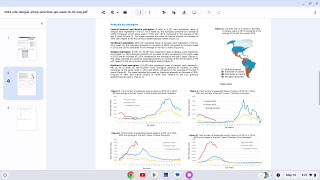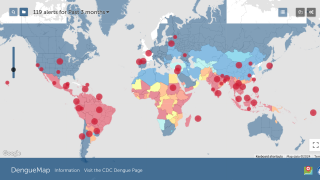Brazil Leads The Americas in Dengue Cases

Over the past 25 years, nearly 18 million Brazilians have been infected with the dengue virus, and according to recent data, 2024 may become the most severe year ever.
To combat the ongoing dengue outbreak, Brazil's Ministry of Health recently promoted a workshop on assistance support, risk stratification, and implementing new vector control technologies through the Secretariat for Health and Environmental Surveillance (SVSA) and the General Coordination of Arbovirus Surveillance of the Department of Communicable Diseases.
"SVSA's work is essential for implementing new vector control technologies to reduce the incidence of disease and improve the health system's response," said Alda da Cruz, director of the Department of Communicable Diseases, in a press release on September 26, 2024.
This effort is essential in 2024 as Brazil again confronts multiple arbovirus disease outbreaks, such as chikungunya, dengue, and Zika, in 177 locations. The highest dengue incidence rates have been reported in Brazil's Southeast, Central-West, and South.
In the state of Rio de Janeiro, with over 12 million residents, various communities have been identified for their dengue burden.
According to the Pan American Health Organization, about 9.6 million cases of dengue and over 5,400 related fatalities were reported in the first nine months of 2024.
Brazil's National Health Surveillance Agency recommends vaccination for certain persons living or visiting dengue-risk areas. This year, Brazil registered 2.2 million first doses of dengue vaccines.
The Secretary of Health and Environmental Surveillance, Ethel Maciel, recently warned about the need to get vaccinated.
"Within the age range indicated by the laboratory for receiving the vaccine, we selected the interval with the highest number of hospitalizations due to dengue in Brazil. However, this group has a lower adherence rate precisely because they are not an age group that routinely uses health services. Therefore, parents and guardians need to take their children and adolescents to get vaccinated. It is an act of love and responsibility," she highlighted on September 24, 2024.
Even though there is a limited vaccine supply, Brazil is offering Takeda's QDENGA® tetravalent, two-dose vaccine. This second-generation dengue vaccine does not require pre-admission testing.
While QDENGA is not offered in the United States, several countries in the Americas are offering it to people.
To alert international travelers of the dengue risk, the U.S. Centers for Disease Control and Prevention (CDC) reissued a Global Travel Health Notice in September 2024 regarding outbreaks in 28 countries.
The CDC recommends that travelers practice mosquito prevention measures to avoid being infected with one of the four dengue viruses. These mosquitoes can also spread Zika and chikungunya viruses.
While most people recover from dengue infection, women who are infected with dengue virus during pregnancy can pass the virus to their fetus during pregnancy or around the time of birth. The CDC says the dengue virus can become very harmful to infants.
Our Trust Standards: Medical Advisory Committee
























